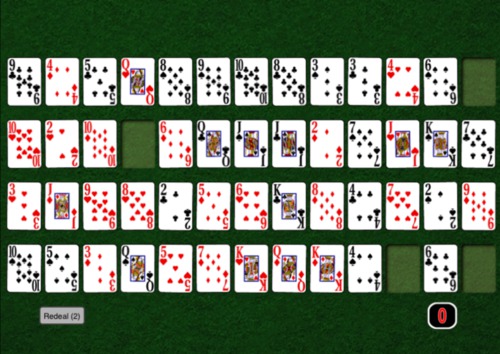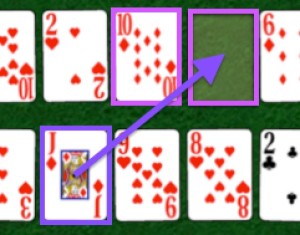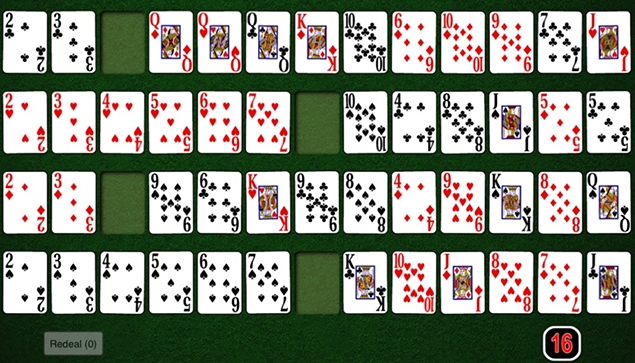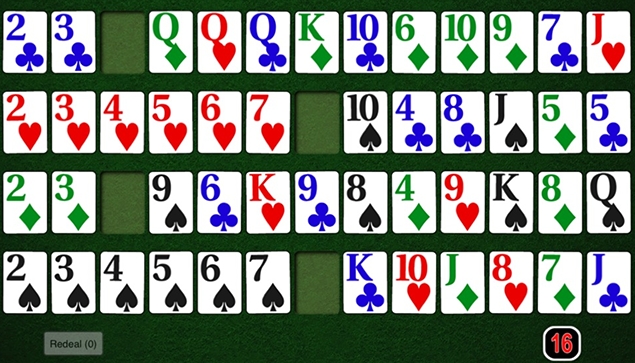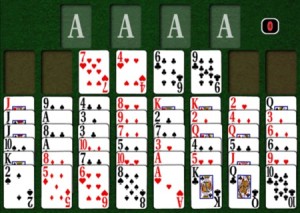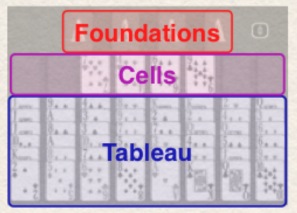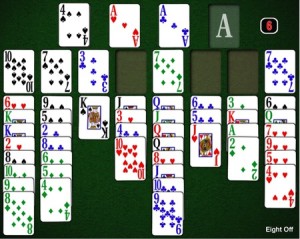Allgood Solitaire offers 230 games, here’s the full list of all the variations you’ll find within …
Accordion (Jumping family)
Aces Up (Clearing family)
Agnes Bernauer (Klondike family)
Agnes Sorel (Klondike family)
Agnes Sorel (easier) (Klondike family)
Alaska (Yukon family)
Ali Baba (Forty Thieves family)
Alsation (Forty Thieves family)
Alternates (No Build family)
American Toad (Canfield family)
Anubis (Pyramid family)
Apophis (Pyramid family)
Arizona (Flower Garden family)
Ascension (Miscellaneous family)
Athena (Klondike family)
Auld Lang Syne (No Build family)
Auld Lang Syne (Easier) (No Build family)
Australian Patience (Yukon family)
Baker’s Dozen (Castle family)
Baker’s Game (Free Cell family)
Beleaguered Castle (Castle family)
Big Forty (Forty Thieves family)
Bisley (Fan family)
Black Hole (Golf family)
Black Widow (Spider family)
Block Ten (Clearing family)
Block Eleven (Miscellaneous family)
Blockade (Forty Thieves family)
Blondes & Brunettes (Forty Thieves family)
Blue Moon (Montana family)
Brigade (Flower Garden family)
Brisbane (Yukon family)
Bristol (Fan family)
British Solitaire (Fan family)
British Canister (Klondike family)
Busy Aces (Forty Thieves family)
Calculation (No Build family)
Can Can (Klondike family)
Canfield (Canfield family)
Canfield by 1s (Canfield family)
Canfield Rush (Canfield family)
Superior Canfield (Canfield family)
Storehouse Canfield (Canfield family)
Canister (Klondike family)
Carlton (Klondike family)
Old Carlton (Yukon family)
Carpet (Miscellaneous family)
Castles In Spain (Castle family)
Ceiling Fan (Fan family)
Chameleon (Canfield family)
Chessboard (Castle family)
Clans (Corners family)
Congress (Congress family)
Corners (Corners family)
Crazy Quilt (Miscellaneous family)
Crescent (Clock family)
Cromwell (Klondike family)
Czarina (Corners family)
Diplomat (Congress family)
Double Athena (Klondike family)
Double Canfield (Canfield family)
Double Corners (Corners family)
Double Fan (Fan family)
Double Flower Garden (Flower Garden family)
Double Free Cell (Free Cell family)
Double Gaps (Montana family)
Double Golf (Golf family)
Double Jump (Jumping family)
Double Klondike (Klondike family)
Double Klondike by 1s (Klondike family)
Double Pyramid (Pyramid family)
Double Scorpion (Spider family)
Double Yukon (Yukon family)
Doublets (Clearing family)
Eagle Wing (Miscellaneous family)
East Haven (Klondike family)
Egyptian Solitaire (Klondike family)
Eight Off (Free Cell family)
Evangeline (Clearing family)
Fan (Fan family)
Feast (Clock family)
Firing Squad (Clearing family)
Five Piles (Clearing family)
Flamboyant Solitaire (Miscellaneous family)
Flamboyant Solitaire (Easier) (Miscellaneous family)
Flower Garden (Flower Garden family)
Fly (No Build family)
Fore Cell (Free Cell family)
Fortress (Castle family)
Forty Pirates (Forty Thieves family)
Forty Thieves (Forty Thieves family)
Forty Thieves Rush (Forty Thieves family)
Four Colors (Free Cell family)
Four Leaf Clovers (Golf family)
Four Winds (Osmosis family)
Fourteen Out (Clearing family)
Fourteens (Clearing family)
Free Cell (Free Cell family)
Free Cell (Easier) (Free Cell family)
Free Cell (Harder) (Free Cell family)
Free Cell (Hardest) (Free Cell family)
Free Parking (Montana family)
Frog (No Build family)
Gaps (Montana family)
The Gate (Congress family)
Gigantic Spider (Spider family)
Golf (Golf family)
Golf (Easier) (Golf family)
Golf (Easiest) (Golf family)
Good Measure (Fan family)
Grand Departures (Clearing family)
Grandfather’s Clock (Clock family)
Great Grandfather’s Clock (Clock family)
Grandmother’s Solitaire (Fan family)
Grounds for Divorce (Spider family)
Hamlet (Forty Thieves family)
Harp (Klondike family)
Herring Bone (Clock family)
House in the Wood (Fan family)
House on the Hill (Fan family)
Indian (Forty Thieves family)
Interchange (Forty Thieves family)
Jumping Spider (Spider family)
King Albert (Klondike family)
King Cell (Free Cell family)
Klondike (Klondike family)
Klondike by 1s (Klondike family)
Klondike Rush (Klondike family)
Klondike Reversed (Klondike family)
Klondike Territory (Flower Garden family)
La Bella Lucie (Fan family)
Letter H Solitaire (Congress family)
Little Spider (Spider family)
Lucas (Forty Thieves family)
Magic Carpet (Miscellaneous family)
Maria Luisa (Forty Thieves family)
Miss Milligan (Klondike family)
Montana (Montana family)
Monte Carlo (Clearing family)
Monte Carlo Thirteens (Clearing family)
Moosehide (Yukon family)
Mount Olympus (Klondike family)
Nestor (Clearing family)
Northwest Territory (Flower Garden family)
Number Ten (Forty Thieves family)
Octave (Klondike family)
Old Fashioned (by color) (No Build family)
Old Fashioned (by suit) (No Build family)
One234 (No Build family)
Open Doublets (Clearing family)
Open Proils (Miscellaneous family)
Osmosis (Osmosis family)
Paganini (Montana family)
Pants (Canfield family)
Parliament (Congress family)
Patio (Clearing family)
Peek (Osmosis family)
Penguin (Free Cell family)
Perseverance (Forty Thieves family)
Phoenix (Klondike family)
Phoenix (Flower Garden family)
Portuguese Solitaire (Castle family)
Pyramid (Pyramid family)
Pyramid Golf (Pyramid family)
Pyramid Pairs (Pyramid family)
Pyramid Seven (Pyramid family)
Blind Pyramid (Pyramid family)
Quadruple Klondike (Klondike family)
Quadruple Interchange (Forty Thieves family)
Rank and File (Forty Thieves family)
Recruiters (Clearing family)
Roaming Proils (Miscellaneous family)
Red and Black (Forty Thieves family)
Red and Black (blocks) (Forty Thieves family)
Red Moon (Montana family)
Room With a View (Fan family)
Royal Garden (Flower Garden family)
Russian Solitaire (Yukon family)
San Juan Hill (Forty Thieves family)
Saratoga (Klondike family)
Scarab (Miscellaneous family)
Scorpion (Spider family)
Scotch Patience (Fan family)
Seahaven Towers (Free Cell family)
Shamrocks (Fan family)
Simple Pairs (Clearing family)
Simple Simon (Spider family)
Simplicity (Klondike family)
Sir Tommy (No Build family)
Spanish Patience (Castle family)
Seven in a Row (Klondike family)
Spaces (Montana family)
Spider (Spider family)
Spider (1 suit) (Spider family)
Spider (2 suits) (Spider family)
Spiderette (Spider family)
Spiderette (Easier) (Spider family)
Spiderwort (Spider family)
Stonewall (Flower Garden family)
Streets and Alleys (Castle family)
Suspense (Miscellaneous family)
Tam O Shanter (No Build family)
Thieves of Egypt (Klondike family)
Three Pirates (Forty Thieves family)
Three Shuffles and a Draw (Fan family)
Thumb and Pouch (Klondike family)
Total Pair (Jumping family)
Towers of Hanoi (Miscellaneous family)
Trefoil (Fan family)
Trefoil + Draw (Fan family)
Triangle (Pyramid family)
Triple Klondike (Klondike family)
Triple Pyramid (Pyramid family)
Unlimited (Forty Thieves family)
Vertical (Clearing family)
Volcano (Fan family)
Westcliff (Klondike family)
Westcliff Rush (Klondike family)
Whistler (Canfield family)
Whitehead (Klondike family)
Wildflower (Flower Garden family)
Will O Wisp (Spider family)
Will O Wisp (suits) (Spider family)
Windmill (Corners family)
Wish (Clearing family)
Yukon (Yukon family)
Yukon Cells (Yukon family)
Zig Zags (Klondike family)
Zodiac (Clock family)
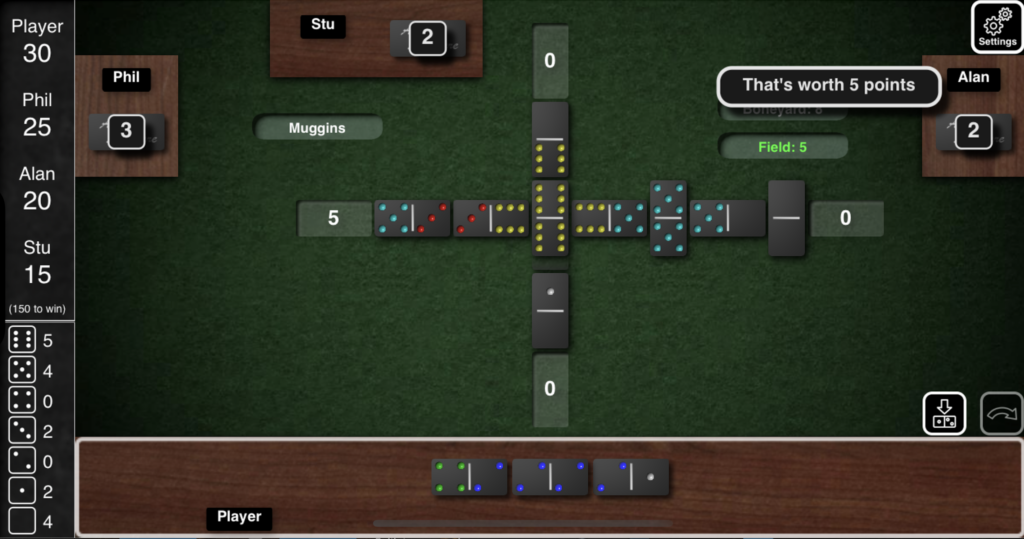
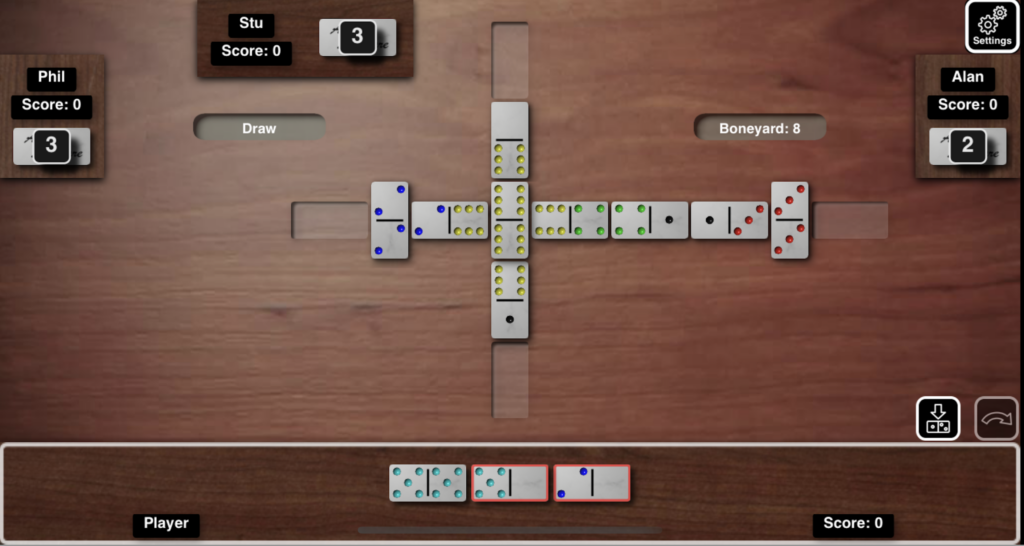
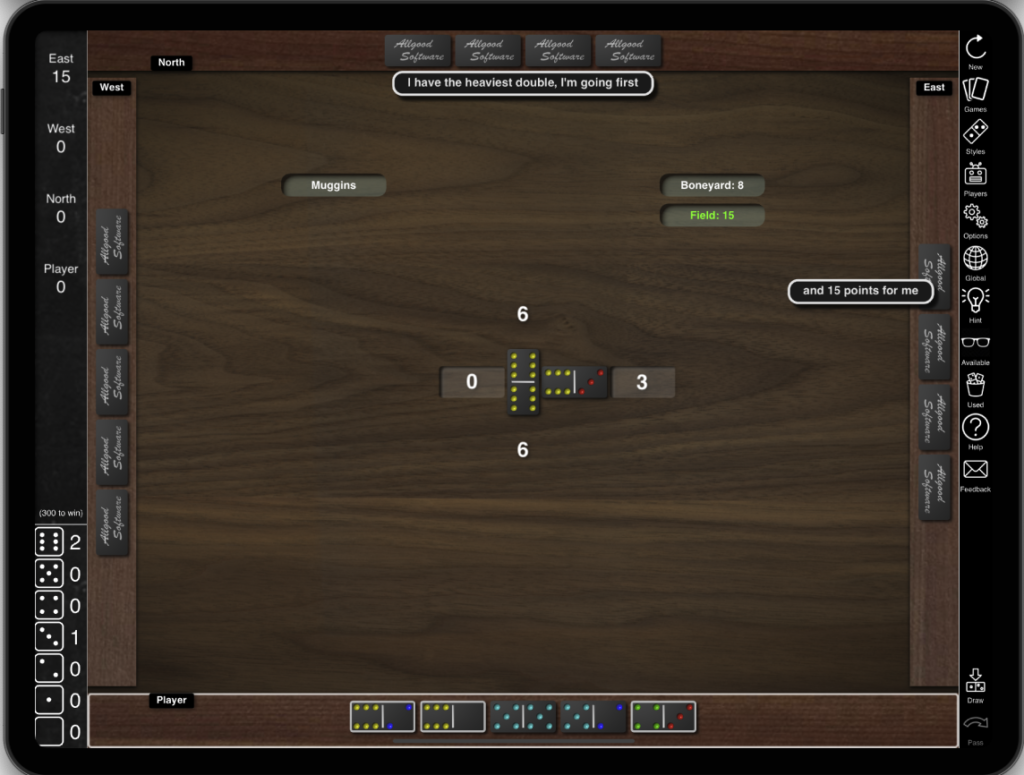
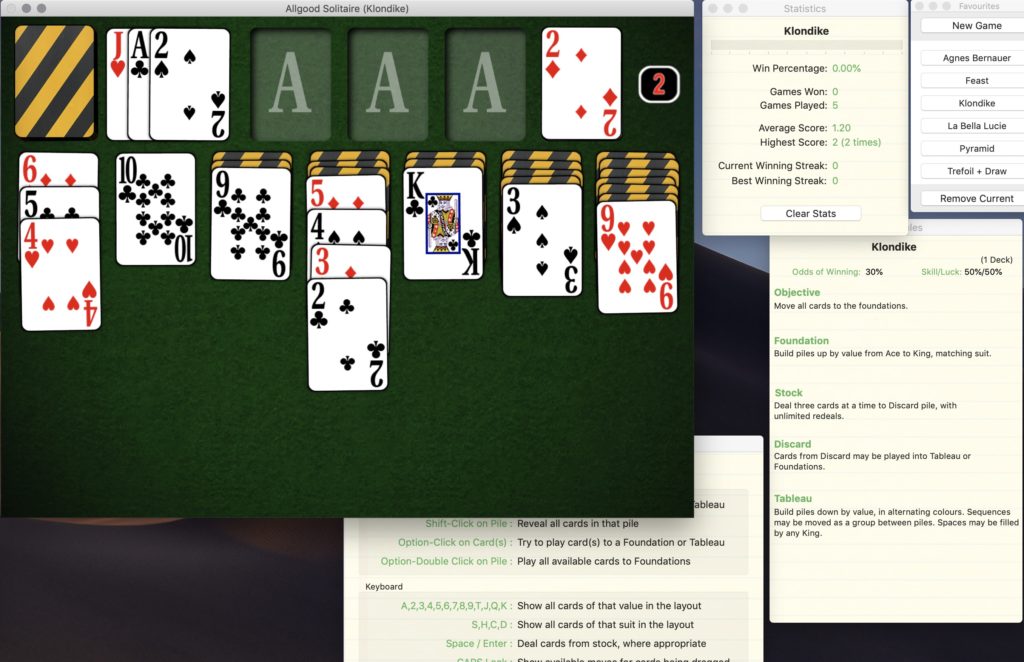
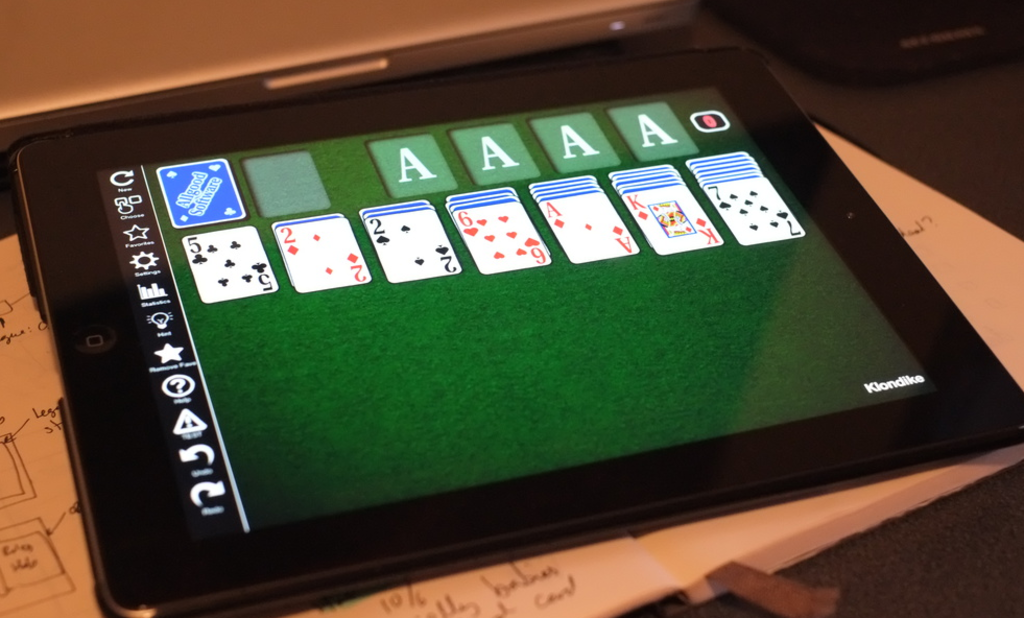
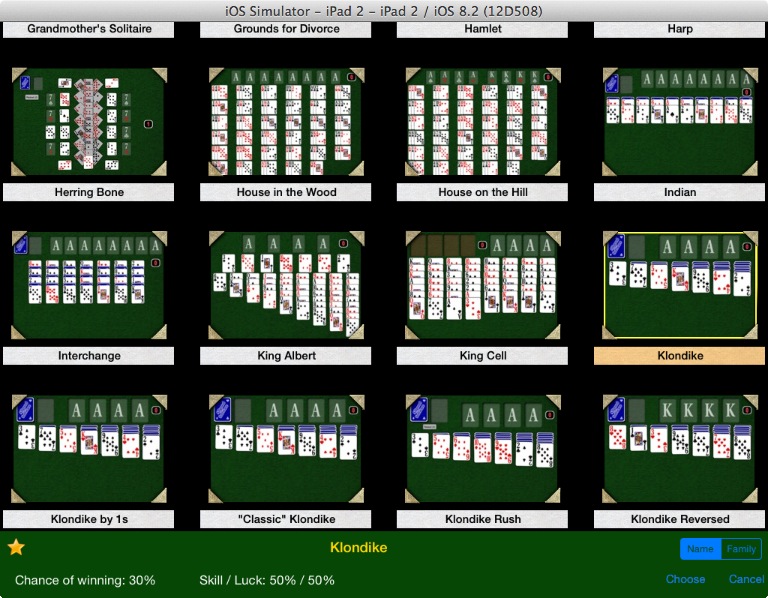
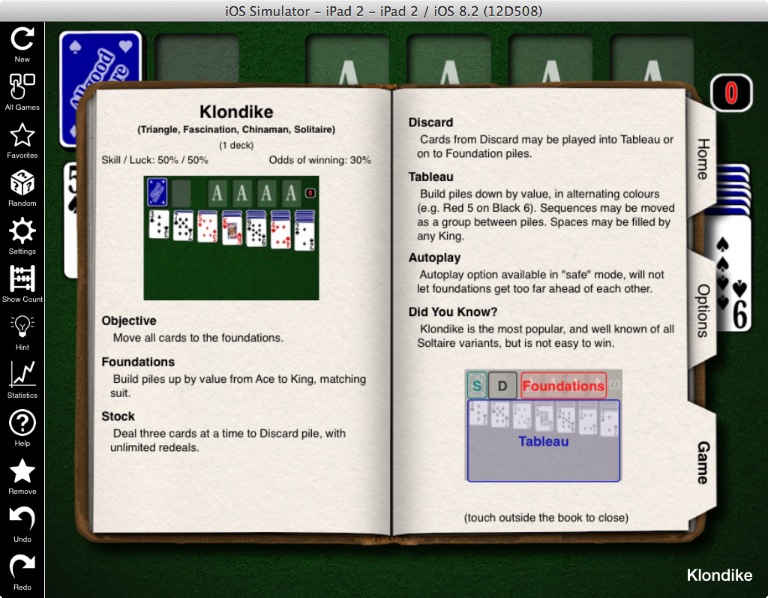
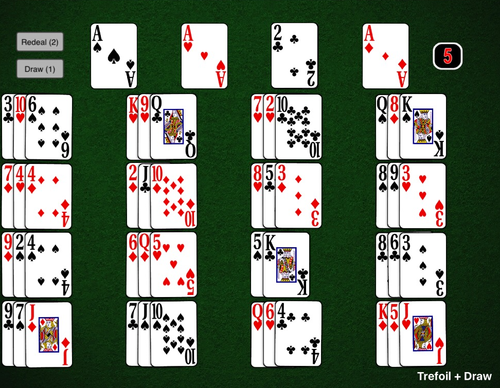 Trefoil + Draw is a classic “Fan” style game, challenging and winnable a lot of the time.
Trefoil + Draw is a classic “Fan” style game, challenging and winnable a lot of the time.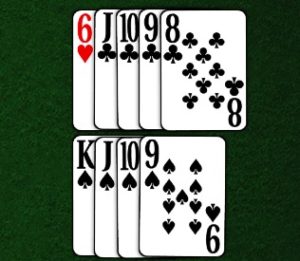 The rules are very simple – build the Foundations up in suit, and you can build the Tableau piles down in suit. Only one card at a time may be moved, and you can’t re-use spaces. The result of this, is that in for any deal you often get one or more cards that are immediately blocked. For example, any cards under a King, which can only be moved directly to Foundations. It also means that a card can only be moved once during a deal, as it only has one possible target it can be played on.
The rules are very simple – build the Foundations up in suit, and you can build the Tableau piles down in suit. Only one card at a time may be moved, and you can’t re-use spaces. The result of this, is that in for any deal you often get one or more cards that are immediately blocked. For example, any cards under a King, which can only be moved directly to Foundations. It also means that a card can only be moved once during a deal, as it only has one possible target it can be played on.
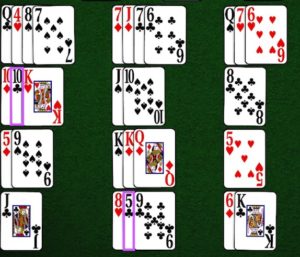
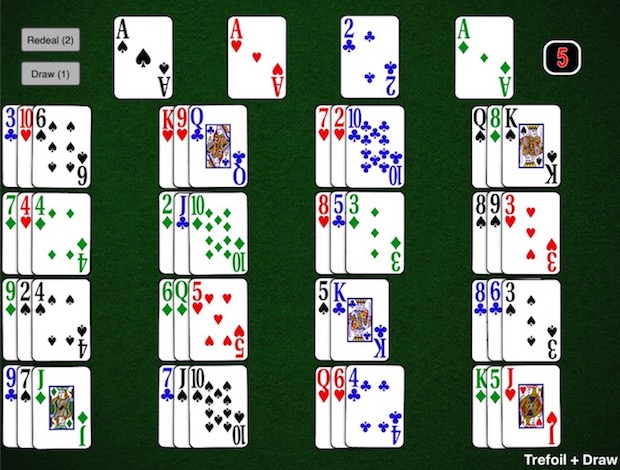 Using the Four Colour deck with Trefoil + Draw
Using the Four Colour deck with Trefoil + Draw